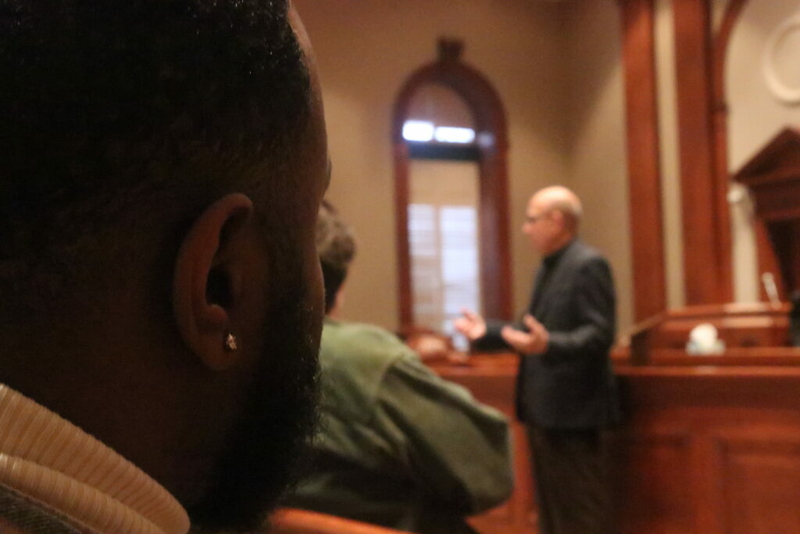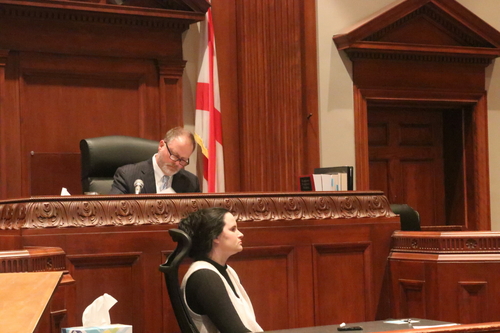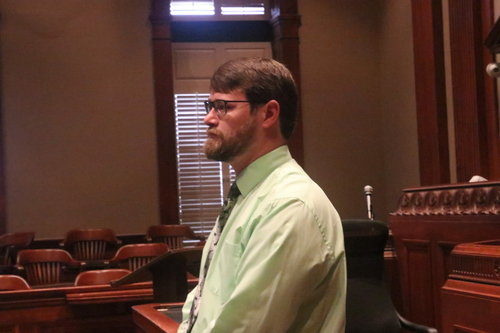In Alabama veterans courts, a focus on rehabilitation, not punishment

Nathan Shack said his turning point came in May 2021, on his daughter’s birthday.
She was four years old that day, and Shack spent several hectic hours preparing for her party. To cope with the stress, he smoked marijuana, as he had since he was a teenager.
“It took all the problems away,” Shack said. “I am a deep thinker, so sometimes I overthink things. It just always took my mind off of the problems I had, and I could just separate all the things I needed to separate in a calm manner. I never got angry when I used. It just kept me at peace.”
He enlisted in the military after graduating high school. In the military, Shack trained as a shower, clothing and laundry repair specialist, and was posted to Texas. But 18 months into his service, he was caught smoking marijuana while on leave.
Given a choice between addressing his drug use or continuing his military service, Shack chose to leave the military.
He returned to Anniston and worked at Sam’s Club until he contracted COVID and ended up in a hospital for two weeks, spending time on a ventilator because he couldn’t breathe on his own. He quit Sam’s Club, fearing he would catch the virus again.
“After I recovered from COVID and my lungs got better, I immediately went back to marijuana, trying to solve my problems and figure out what I was going to do next,” Shack said. “I don’t know how I always leaned on marijuana as a best friend. I don’t know, marijuana was always in my corner.”
On his daughter’s birthday, a sheriff’s deputy pulled him over. The law enforcement officer told him he noticed the smell of marijuana and asked to search his car.
The soft-spoken Shack, a native of Anniston, agreed to the search. The deputy found the joint he had been smoking. Shack was arrested, booked into the county jail, and charged with possession of a controlled substance.

Shack spent the night in county jail and made bond the next day. He missed his daughter’s birthday party.
His attorney suggested an alternative to the court system.
“He informed me of a program called veterans court that I had never heard of, and that it could spare me from a record,” Shack said.
The program, which has operated in Alabama for over a decade, is one of several diversion programs aimed at keeping people out of jail and connecting them with resources to substance abuse or mental illness. Advocates for veterans court believe it shows success in helping veterans avoid imprisonment and reoffending.
But Alabama’s program remains limited, and efforts to expand it have uncertain prospects in the current legislative session.
Flipping a court paradigm
In a typical court setting, a prosecutor will try to convict a defendant and a defense attorney will try to exonerate or at least get a better outcome for a client. It’s an adversarial proceeding whose outcome hinges on the best argument made to a judge or jury.
Veterans court proceedings flip that paradigm on its head.
At a veterans court meeting in Anniston last Tuesday, several individuals were in the courtroom to provide assistance to the defendants. While no prosecutor took part in the proceedings, a representative from the district attorney’s office is usually involved in the case.
There was also a representative from the U.S. Department of Veterans Affairs, who could identify programs for the individual. There were mentors, often ex-military, who assist defendants with any questions they ask.
Alongside them are community service providers, some of whom operate as nonprofits, that offer counseling or logistic support that align with their mission. A representative of Highland Health System, which provides mental health services, also attended the hearing.
Veterans charged with violent crimes, sexual offenses or drug manufacturing or distribution are excluded from the program. Beyond that, the only other requirement is prior service in the armed forces. Combat experience is not required.
For those who are eligible, entry into the program begins when a person is charged with a crime. A veteran can volunteer for the program while being booked. Once they do so, they will appear before a judge.
Speaking to one veteran on Tuesday, Calhoun County Circuit Court Judge Tim Burgess listed the conditions of the program. The defendant had to plead guilty to the charge, which could bring up to a year in jail and fines and fees if the veteran did not complete the program.

From there, the person is then transferred to the veterans services officer who acts as the person’s case officer and point of contact for services. Daniel Sheppard, the veterans service coordinator for Calhoun and Cleburne counties, develops plans for each individual.
“I am kind of the clutch, and I start engaging those services to get them in there,” he said.
Participants meet with Sheppard twice a week. They are tested for illegal drugs, and Sheppard ensures they take their medication, check in with their mentors and are following the plan.
Veterans typically stay in the program for at least a year. Officials develop exit plans as clients get closer to their departure.
Veterans treatment court in Alabama
A Buffalo judge named Robert Russell created the first veterans court in 2008. Chris Deutsch, a spokesman for Justice for Vets, an organization that provides training for staff and volunteers at veterans’ courts, said Russell saw a growing number of veterans struggling with mental illness or substance abuse.
According to Deutsch, Russell asked two members of his staff who were veterans of the Vietnam War to speak with a defendant who had not responded to treatment. By the end of conversation, the defendant stood at attention in front of the judge and answered the questions.
“At that moment the judge and his team recognized there was a therapeutic element to the camaraderie that exists among veterans,” Deutsch said.
The program centers on veterans providing other veterans support. Other components include the veteran service coordinator, a person who serves as a primary point of contact and connects the veteran to available services.
Deutsch said there are 400 veterans treatment courts throughout the country.
According to the Alabama Bar Association, Montgomery Circuit Court Judge Tracy McCooey started an unofficial veterans treatment court in April 2010 by directing county jail administrators to interview people entering custody on their veteran status.
McCooey then assigned the veterans to her drug or mental health court docket. She then requested assistance from the Tuskegee Veterans Administration Medical Center to counsel veterans and connect them to benefits.
Birmingham Municipal Judge Andra Sparks established Alabama’s first traditional veterans treatment court in 2011.
That same year, the state established a task force to investigate the possibility of founding a statewide veterans diversion program specifically for veterans. In the fall of 2011, Alabama Chief Justice Chuck Malone designated Shelby County Circuit Court as a pilot court site for veterans treatment court.
Shelby County held its first veterans treatment court docket in November 2012. One year later, the county had its first graduating class.
The state now has 26 veterans treatment courts, said Donna Oates, who oversees the program for the Alabama Administrative Office of Courts.
The growing popularity of diversion
Diversion programs like veterans court have gained popularity in recent years as an alternative path to traditional methods of incarceration and punishment long part of the criminal justice system. Miriam Krinsky, founder and executive director for Fair and Just Prosecution, a criminal justice reform advocacy group, said the programs recognize that many people going through the courts have health issues law enforcement officials are not trained to handle.
“Jailers, judges, and lawyers are not mental health and substance use experts or professionals,” she said. “Those of us in the criminal justice system don’t know best how to treat a mental health, substance abuse, or public health crisis — and we shouldn’t pretend to know best.”
In Alabama, the full impact of the veterans courts is not clear. Veterans’ treatment is decentralized, and different jurisdictions may take different approaches to funding, treatment and marketing, making hard numbers difficult to come by. The Alabama Administrative Office of the Courts had not responded to an on-the-record request for statistics as of Friday.
Supporters swear by the results they see. According to a report published in March of this year by the veterans treatment court in Calhoun County, the recidivism rate of program graduates was just 1%.
VTC Flyer-RepresentativesKrinsky referred to a program named Law Enforcement Assisted Diversion that is available in several large metropolitan areas that include Seattle, Santa Fe, Albany and Baltimore.
It is a pre-booking diversion program for people charged with drug possession or dealing drugs, prostitution or other charges related to poverty or mental health.
The program has enjoyed success, reducing the likelihood of rearrest by 58% compared to the control group. The treatment group also had a 39% less likely chance of getting charged with a felony versus the control group.
“The intervention was also highly cost effective, saving over $8,000 in justice system utilization costs per year per participant compared to a control population,” the study said.
Prisons and jails also remove people with addiction or mental health issues from support networks of family and friends. The jail setting is not set up to provide such services, and Krinsky said they do a poor job in terms of getting results.
“They are overcrowded facilities,” she said. “They are not healthy environments that are very traumatic in their own right.”
The successes veterans’ courts achieve owe much to the Veterans Administration (VA). Those who served during the Vietnam War or served at least two years in the military after 1980 qualify for health care services through the VA. When the agency provides treatment, local governments can spend less.
The Veterans Administration has come under fire because of the backlog of veterans left waiting for assistance, but few have complained about the support they receive from the agency. Veterans for the most part receive the help they need, according to Oates.
Judge Burgess said that gives the court the flexibility to design a program.
“The beauty of veterans court is that we can tailor pretty much any person’s needs, we have a resource to dip into to serve that need,” Judge Burgess said. “Some of the other diversion courts that I run, we have limited resources, limited tools. Veterans court is almost an unlimited toolbox for us because between the community resources, the Veterans Administration, with the help of our mentors, with the help of Highland Mental Health, there are not many things that we can’t help with.”
The underserved
Advocates have praised the veterans treatment court for the benefits it provides, not only to veterans but to the community. Krinsky said the veterans’ court movement is part of a move away from old standards of law enforcement.
“I think we have seen, especially over the last 10 to 20 years, the recognition that what we used to do in the past, the autopilot of assuming that we could prosecute and incarcerate our way to improved outcomes, both for the individual and the community, didn’t work,” Krinsky said.
But veterans court is not always a practical possibility for veterans.
Currently, treatment courts are concentrated in the north central part of the state, in places like Montgomery, St. Clair and Calhoun counties. In the southeast, Covington, Coffee and Geneva counties offer the program. But several counties in northwest Alabama, east Alabama and Black Belt do not have dedicated veterans courts.
“If there is not a huge population of veterans in their area, they will let them do adult drug court,” Oates said. “There are various reasons that not every place has veteran treatment courts.”
Some of these alternative options may be at capacity and unable to accommodate another entrant.

In addition, state law does not require court or law enforcement officials to recruit veterans for treatment court. At times, officers in a jail will screen inmates for potential eligibility and then ask those in custody if they are interested in treatment court. But recruiting is largely voluntary and done on an ad-hoc basis by someone in the court who knows the program exists.
Shack only knew about it because of the attorney he hired.
Veterans must also choose to go through the program. Some may decline the option and go through the traditional court system instead.
Building on success
Advocates now want to build on that success by codifying the program into state law. Legislators may consider a bill that would provide veterans legal and rehabilitation assistance.
Katie Exum, a Jacksonville business owner and Alabama House candidate last year, submitted the proposal. It would make veterans court an independent entity, like adult drug courts.
“I want to make this statewide,” she said. “I want to put it in actually statutory language. We have drug courts as statutory law. I would like to have a veterans treatment court as statutorily regulated, across the board, protection statewide.”
Sen. Andrew Jones, R-Centre, supports the idea.
“I think it is a great bill, a great concept,” he said. “We just got it worked out to where it is flawless.”
But Rep. Ed Oliver, R-Dadeville, the chair of the House Veterans and Military Affairs Committee, said the chief question is funding.
“One of the things that we are trying to figure out right now is what funding follows a veteran,” Oliver said. “What federal money, what does the person get? We have a disconnect between our court system and what those veterans get at this point.”
Oliver plans to take up the proposal soon but said it will not likely pass through the committee and will probably be referred to a subcommittee.
“If we can, I would like to pass something this year,” he said. “Understand, we don’t want to pass a bad bill. It becomes very important that we have enough time to do the research. For me, a subcommittee doesn’t mean killing a bill. A subcommittee means that I expect the people to do the research and come back and tell us what to do.”
Oliver said he wants to pass a version of the bill during this year’s session.
Calhoun County, meanwhile, will continue its use of the courts. Judge Burgess said focusing the process on rehabilitation and not punishment helps those in the program.
“You have veterans sitting in court surrounded by their peers, in a courtroom where the staff, anywhere from the judge to the prosecutor, defense, treatment providers, case managers, all recognize that these individuals are individuals who have served,” he said. “They have a cultural competency to talk to them in a way that resonates. The biggest thing is that they are being connected to specific treatment best suited for them.”
Shack said that was his experience. He has stopped smoking marijuana and says he spends more time with his family.
“Now I get up and I am full of energy, way more active with my children,” Shack said. “I can go all day with them. I feel free. I don’t need anything now.”








